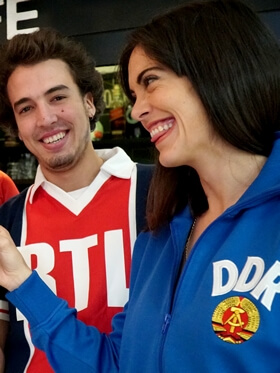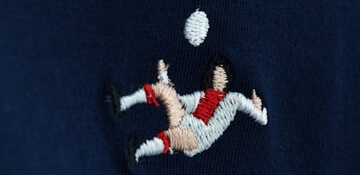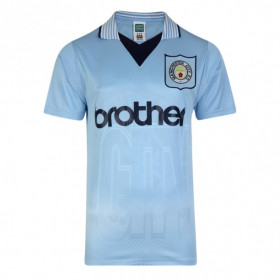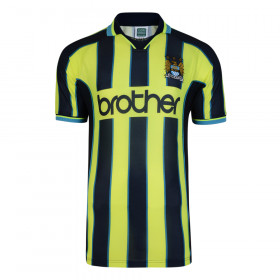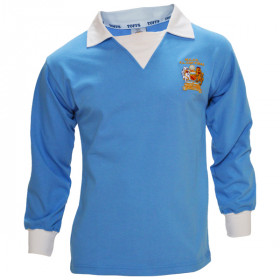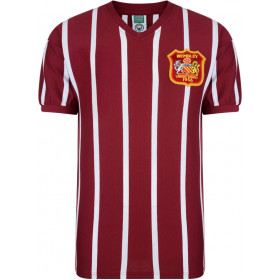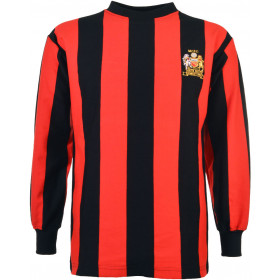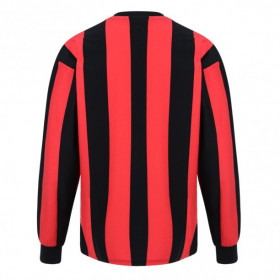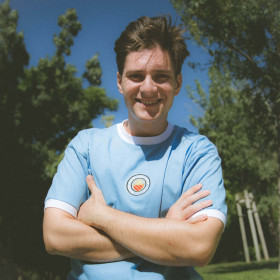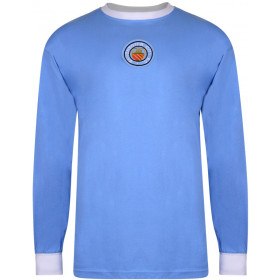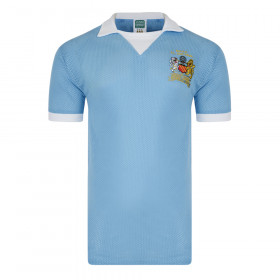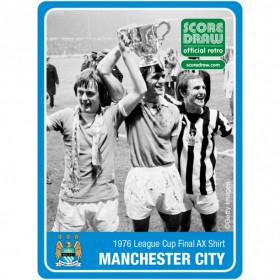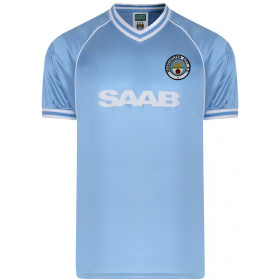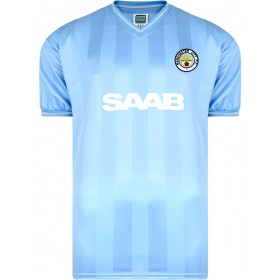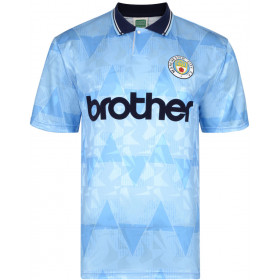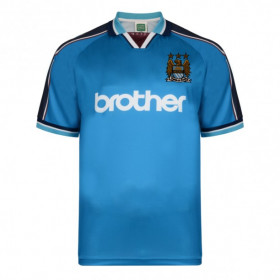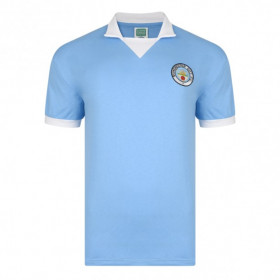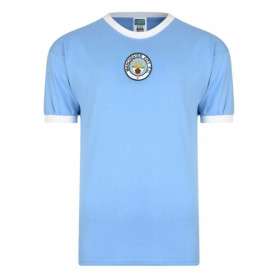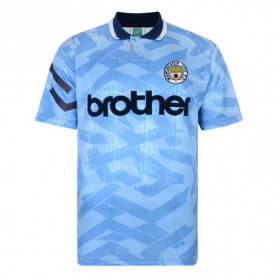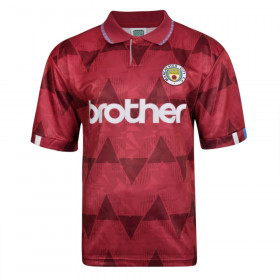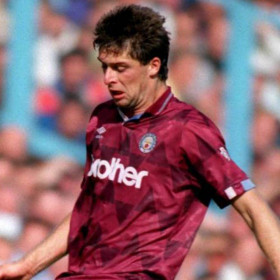Manchester City FC

-
Manchester city retro shirt
£55.39
The official retro jerseys of Manchester City are very interesting for our shop, because they represent historic moments of the citizens. Manchester City has since the beginning its biggest rival inside the city, Manchester United, the most decorated club in english football. The inhabitants of Manchester have successfully resisted the attraction of the red devils. Our classic Manchester City jerseys stand for diverse periods of the club history:
• Retro Jersey of Manchester City 1956, in which the club thriumphed in the FA Cup after 22 years. City, trained by coach Les McDowall, won the final against Birmingham City with 3:1, scored by Hayes, Johnstone and Jack Dyson. The Legend Don Revie, later coach of Leeds United and the English national team in the 70s, was playing as a forward for City.
• Classic Shirt of Manchester City in 1970, the campaign which led to an historic double composed of the League Cup and European Cup- Winners’ Cup, as of today the only European cup win in the club history. Manchester city, leaded by Joe Mercer, won against the polish team Gornik Zabrze with 2:1, by goals of Neil Young and Francis Lee. The Skyblues had with the number 8 Alan Oakes, the player with the most decorations and appearances in the club history of Manchester City. Between 1959 und 1976, Oakes played 680 times in the league and club competitions.
• Manchester City Retro Shirt of the 1998-99 campaign, where the club went on to the final of the promotion playoffs to the first league. In a dramatic match, City won against the FC Gillingham on penalties, standing 2:2 after extra time. It was the moment of reawakening of the Cityzens, supported by the British band Oasis with their album “What’s the story morning glory?” that made the fans of the club famous around the globe.
Enjoy as a real Manchester City supporter our stylish shirts of the famous Manchester Club. Our Shirts are perfect for evenings in the park or for enjoying a beer with friends. Footballfashion for men with class.
A brief history of Manchester City
Foundation and early years
The birth of Manchester City
Manchester City was formed in 1880 by Arthur and Anna Connell. Arthur was a rector at St. Mark’s Church and his daughter Anna was deeply saddened by the state of her area, with fights between the downtrodden and impoverished men being very common.
After starting a cricket club, she decided that another club was needed to fill the winter months and Saint Mark’s FC was born. The team was not successful, winning only one game in its first season, but it succeeded in providing something that people could become interested in and be distracted from their lives.
The club was renamed a few times in its early years, to Gorton FC and Ardwick AFC, until 1894. After some financial troubles, the club was restructured and redesigned and the name Manchester City was agreed upon. Manchester City Football Team was born for all Mancunians.
Manchester City’s Early Years
In 1899, Manchester City claimed their first ever title, winning the Second Division and therefore winning promotion to the First Division. Billy Meredith was the star player that season, a very talented right winger that was nicknamed “the Welsh Wizard” by his fans.
In 1904 the first major honours came to Manchester when Manchester City won the FA Cup, thanks to a Billy Meredith goal against Crystal Palace. Unfortunately, an investigation into how the club was run led to seventeen players being suspended due to alleged financial misconduct, and Billy Meredith transferred to Manchester United, a big blow for the Citizens.
Few fans today realise that City was the first team from Manchester to win a major trophy, so that FA Cup was even sweeter for the team in light blue. The players wore light blue shirts from 1894 onwards, usually with white shorts and blue socks.
The first badge that Manchester City had was very similar to the one they have today, with a crest depicting a ship and diagonal stripes in the middle of a circle saying Manchester City FC. The ship refers to the famous Shipping Canal while the stripes are attributed to the Grelley family, who were feudal lords of Manchester.
The thirties: a tumultuous time
Having moved to Maine Road in 1923, Manchester City was a very popular team. In 1934, 84,569 fans attended the match and (i have added this) the Citizens acheived the record for the highest attendance in an English club game ever, a record that still stands for domestic competitions and only been beaten by Tottenham Hotspur in the Champions League in 2016 with 85,512.
This record came in the sixth round of the FA Cup against Stoke City, a competition that they would go on to win for the second time in their history. They had lost to Everton the previous year in the final, so it was a great relief for the City football team to emerge victorious against Portsmouth.
Then the Citizens won the First Division in 1937 in great style, scoring over 100 goals in the league. The success was short lived however, and they were relegated the following season, the first time the champions have been relegated.
The Post-War era
1956 FA Cup Final
In 1956, Manchester City faced Birmingham City in their sixth FA Cup final. Birmingham were the favourites before the game, but Manchester City managed to overcome them and win the game 3-1.
This final is remembered very fondly by fans thanks to one player, Bert Trautmann, and it has become known as the Trautmann final. With seventeen minutes left, he dove at the feet of an onrushing Birmingham player and received a knee to the neck.
With no substitutions allowed, he continued to play despite being in visible and serious pain, and it transpired after the match that the collision had broken his neck. He made two more saves after this point and had to be revived by the trainer, but he refused to let anyone else go in goal and City were able to lift the trophy.
Joe Mercer - 1965
After their relegation, Manchester City’s football team experienced a considerable decline, and in 1965, they had a record low home attendance of only 8,000 fans and change was needed. It came in the form of Joe Mercer, who was appointed in the summer of 1965.
In his first season, he led the Citizens to the Second Division title, giving First Division football back to the fans that they had been waiting for. He reshaped the team, made important changes and training became more focused, disciplined and advanced.
In 1968, success returned to Manchester City as they won the First Division for the second time in their history. They did so on the final match by beating Newcastle United 4-3, condemning their arch rivals Manchester United to second place.
The following season, in 1969, City’s football team managed to win the FA Cup for the fourth time. This led to their qualification to the European Cup Winners’ Cup for the next season, which they managed to win thanks to a 2-1 victory against Gornik Zabrze as well as winning the League Cup.
Although rival fans like to mock Manchester City’s team for a lack of history, they won the first major honours in Manchester, they have the record for the highest attendance in a domestic English professional club match ever and they were the first English team to win both a European trophy and a domestic trophy in the same season.
The seventies
However, in 1971, Manchester City’s board experienced a take over and Mercer lost his job. The Citizens managed to win a League Cup in 1976, but other than that, a long period of mediocrity plagued the club once again.
There was one highlight for the light blue team however, when in 1974, they beat Manchester United at Old Trafford to confirm their rival’s relegation. To make it even sweeter, it was an ex-United player who scored with a backheel to win the game.
During all of this, both badge and kit changed very little, staying true to the light blue kit and the round badge with a ship on it. Socks became white, sometimes with stripes of various colours on them, but generally the design remained simple changes during the history of the club from polo shirts with polo collars to round neck shirts, to a v-neck shirts, as you can see above. From around 1976 the shirts got small changes in the design wiht added details.
The eighties
The eighties were a difficult decade for the City team, and they went through seven managers, which was excessive considering the time period. An FA Cup final in 1981 was the height of the decade and it ended in a 3-2 loss against Tottenham Hotspur.
They yoyoed between the First and Second Division, getting promoted and relegated every couple of years. They managed to get promoted in the 1988-89 season, but again the next season, relegation looked a real possibility.
They did however in 1989 manage a massive 5-1 win against rivals Manchester United, who Sir Alex Ferguson had recently taken over. The legendary Scottish manager has since stated that it was his most humiliating defeat of his entire managerial career, which is not a feat to be sneered at.
The Premier League era
The nineties
The club was part of the first ever Premier League and even managed a respectable mid-table finish, but they were far from challenging for the title, and they struggled considerably until 1996, when they were relegated to the First Division.
A flurry of managers was signed and then resigned or sacked, including Steve Coppell who resigned after only six matches and 33 days at the helm of the club, stating that it was too much pressure.
Performances from the Citizens continued to disappoint and in 1998, disaster struck: they were relegated to the Second Division, the first English team to have won a European cup to be relegated to the third tier of football.
The following season was make-or-break. Although clubs can recover from one season in a lower division, it is so easy to become used to the division and building from there is far more difficult. In typical City fashion, they qualified for the play off final to be played at Wembley against Gillingham.
When looking at the two clubs’ fate today, the game was extremely important. City were a goal down before Paul Dickov scored a late equaliser that took the game to a penalty shootout which the Citizens won. In 2001-02, they managed to win the First Division, breaking the record for number of points along the way and they were back in the Premier League after the darkest time of their history.
Building towards success
Kevin Keegan was the man who oversaw this First Division victory and he brought some much needed stability to the Manchester club. He made some impressive signings, including Nicolas Anelka, Peter Schmeichel and Marc-Vivien Foé. Tragically, Foé, who had arguably been City’s best player for a season, collapsed in a game with his national side and died despite the medical team’s best efforts.
Despite being decent, the Manchester City side could never get to the better level that the fans dreamed of or qualify for European football, and Keegan resigned in 2005.
Thai businessman Thaksin Shinawatra bought the club, but after financial disarray almost ruining the club, he was forced to sell, and the Abu Dhabi United Group took over. Sheikh Mansour was the driving force behind this, and it was clear that he was willing to back the club financially.
Manchester City’s Golden Era
Since the Abu Dhabi takeover, Manchester City have moved from strength to strength. Some of their signings have become world-class players, most notably Sergio Aguero, David Silva, Yaya Toure and Kevin de Bruyne.
Aguero has been an incredibly deadly striker, and his goals have pushed the Citizens to four Premier League titles. The first came in 2012 and is without a doubt the most dramatic final day of any Premier League season.
Anything other than a win would give their arch rivals Manchester United the title as City played relegation threatened Queens Park Rangers. City went 1-0 up and what should have been an easy win quickly turned into a nightmare as Queens Park Rangers scored two goals despite getting a player sent off.
In the 92nd minute, Edin Dzeko equalised which still wasn’t enough to clinch the title. Up stepped Sergio Aguero, scoring the trophy winning goal, sending the fans into euphoria and marking the ascension of Manchester City into the history books. The cry of “Aguerooooooooooooooo” is familiar to all Premier League fans, and is particularly delightful for the Citizens.
 Retrofootball
Retrofootball  Belgium
Belgium  France
France  Germany
Germany  Italy
Italy  Portugal
Portugal  Spain
Spain  Switzerland
Switzerland  United Kingdom
United Kingdom  other countries
other countries  Retrorugby
Retrorugby 
